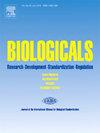Regulatory changes during the Covid-19 pandemic: A comparative review of the European Union and Brazilian regulations for biological and biotechnological products
IF 1.5
4区 生物学
Q4 BIOCHEMICAL RESEARCH METHODS
引用次数: 0
Abstract
The process for registration of biologic products is lengthy due to the high number of studies and data required by the health authorities. However, with the COVID-19 pandemic, and the urgent need for an alternative, the authorities reduce the time for registering new products with the challenge of maintaining all the necessary reliable standards. The objective of this paper is to compare the regulatory requirements for biologics in Brazil and the European Union in the context of the pandemic and evaluate the background differences in regulations before and after the emergency. The searches were conducted in the databases of EMA and Anvisa and the results were assessed for type of document/product, regulatory scope/process step, effectiveness, and year of publication/update. Both regulators foresaw the route of registration for emergency use and followed international standards, with strict requirements for quality, safety, and efficacy. After the end of the health emergency, while EMA gradually phased out the emergency regulations, Anvisa withdrew them. It was observed that the challenges faced by the Brazilian authority and industries were related to the lack of a centralized health monitoring system. The regulators were overall aligned in the approaches during the pandemic and both had a regulatory emphasis on vaccines but the measures taken after its end differed. The main difference observed was the slower phase-out and the adoption of lessons learned strategy in the EU, which should be learning points for Anvisa if targeting a continuous readiness strategy for health emergencies.

2019冠状病毒病大流行期间的监管变化:对欧盟和巴西生物和生物技术产品法规的比较审查
由于卫生部门需要大量的研究和数据,生物制品的注册过程十分漫长。然而,随着 COVID-19 的流行,以及对替代品的迫切需求,当局缩短了新产品的注册时间,但同时也面临着维持所有必要的可靠标准的挑战。本文旨在比较巴西和欧盟在大流行病背景下对生物制剂的监管要求,并评估紧急情况前后监管的背景差异。在 EMA 和 Anvisa 的数据库中进行了搜索,并根据文件/产品类型、监管范围/程序步骤、有效性和发布/更新年份对搜索结果进行了评估。两个监管机构都预见到了紧急使用的注册途径,并遵循国际标准,对质量、安全性和有效性提出了严格要求。紧急卫生事件结束后,EMA 逐步取消了紧急条例,而 Anvisa 则撤销了紧急条例。据观察,巴西当局和行业所面临的挑战与缺乏集中的卫生监测系统有关。在大流行期间,监管机构在方法上总体上是一致的,都将监管重点放在疫苗上,但在大流行结束后采取的措施有所不同。观察到的主要差异是欧盟的逐步淘汰速度较慢,并采用了吸取经验教训的战略,如果安维萨将目标锁定在卫生紧急情况的持续准备战略上,这些都应成为安维萨的学习要点。
本文章由计算机程序翻译,如有差异,请以英文原文为准。
求助全文
约1分钟内获得全文
求助全文
来源期刊

Biologicals
生物-生化研究方法
CiteScore
3.70
自引率
0.00%
发文量
39
审稿时长
48 days
期刊介绍:
Biologicals provides a modern and multidisciplinary international forum for news, debate, and original research on all aspects of biologicals used in human and veterinary medicine. The journal publishes original papers, reviews, and letters relevant to the development, production, quality control, and standardization of biological derived from both novel and established biotechnologies. Special issues are produced to reflect topics of particular international interest and concern.Three types of papers are welcome: original research reports, short papers, and review articles. The journal will also publish comments and letters to the editor, book reviews, meeting reports and information on regulatory issues.
 求助内容:
求助内容: 应助结果提醒方式:
应助结果提醒方式:


